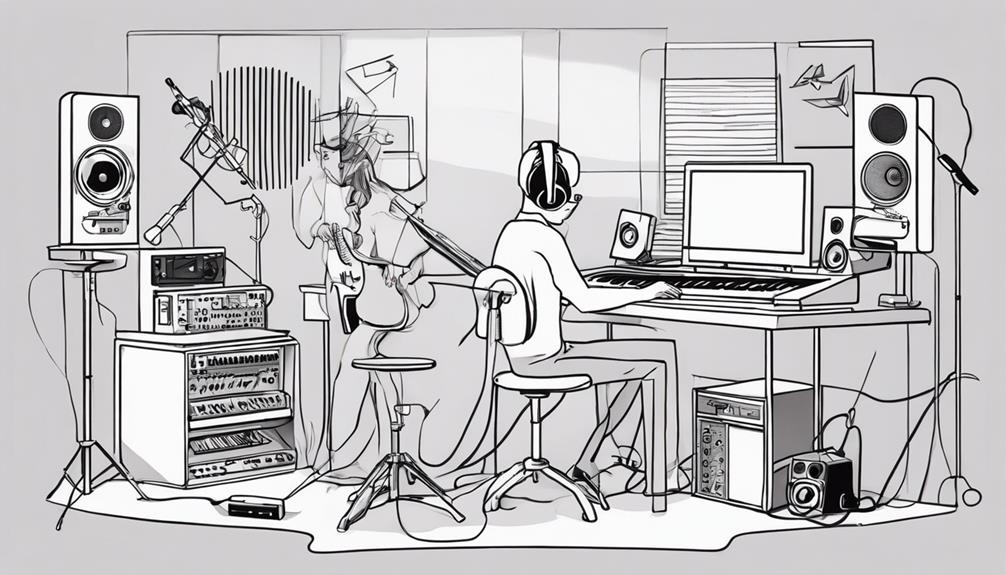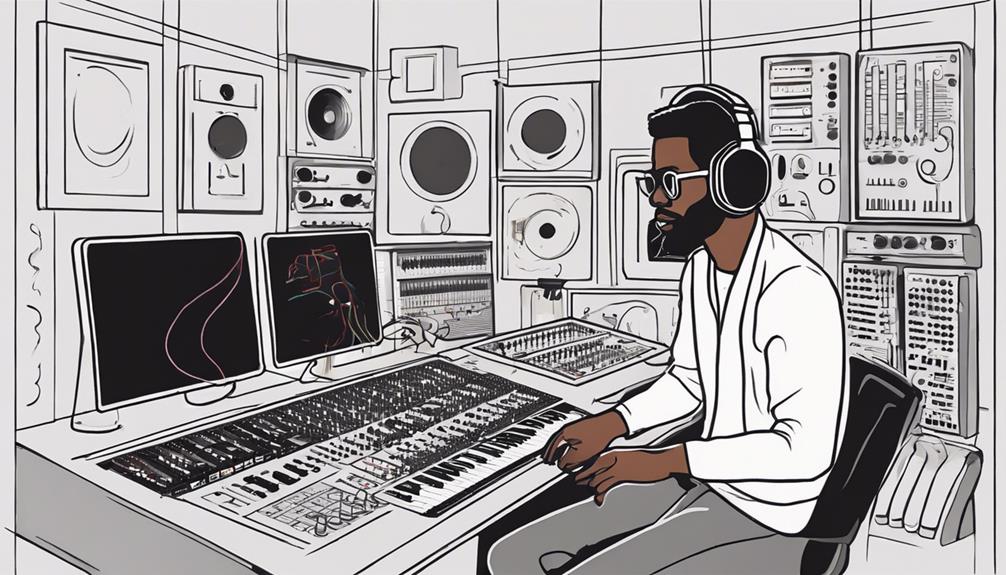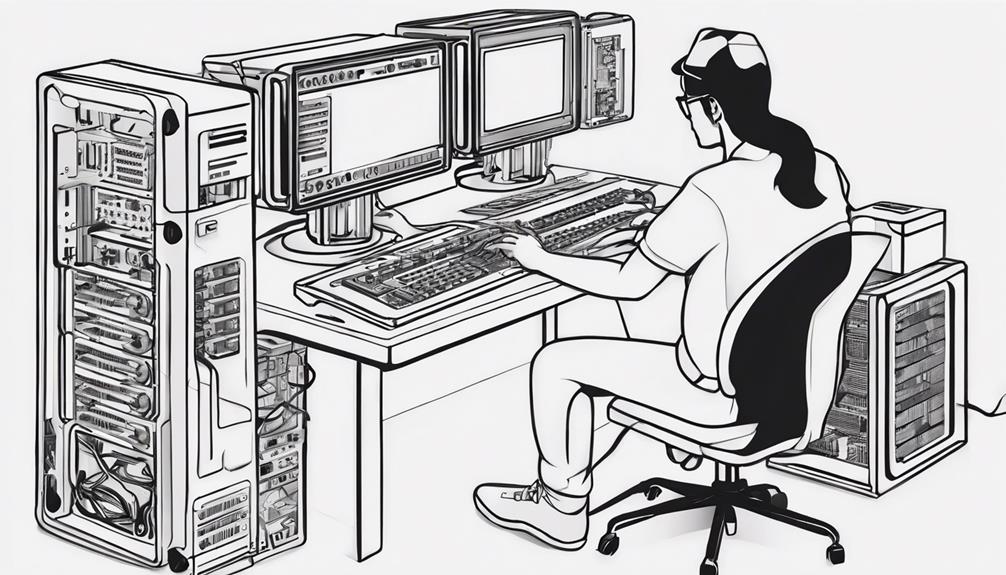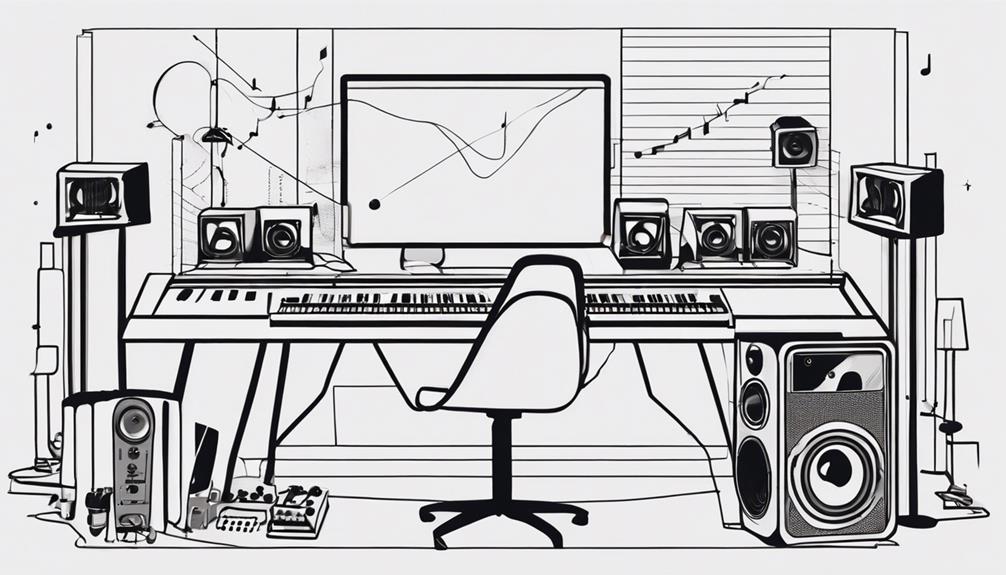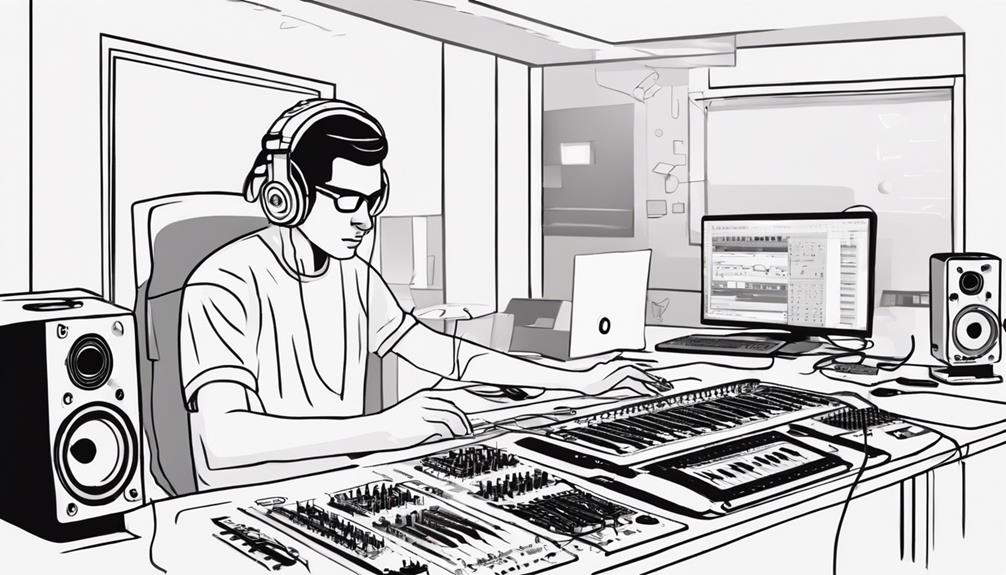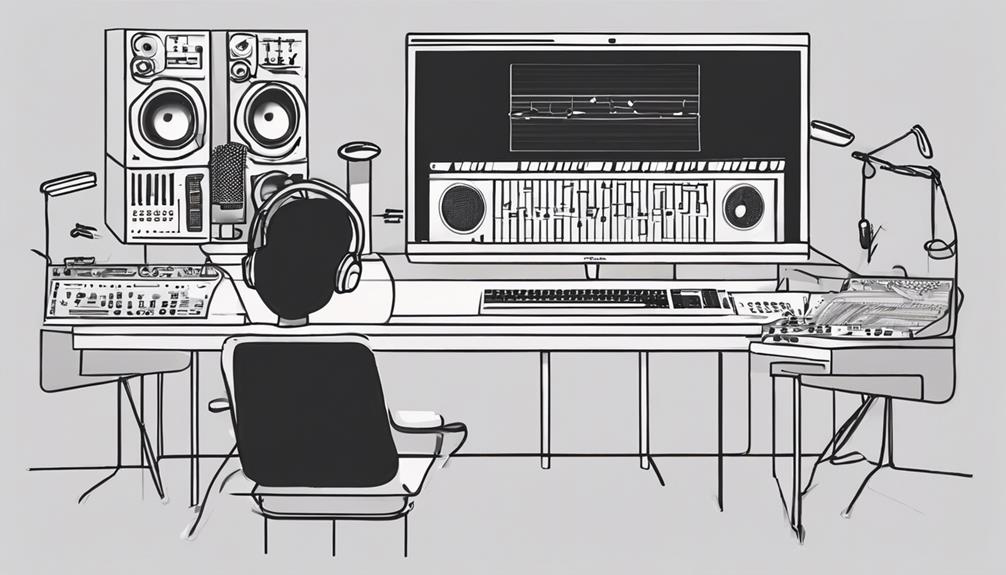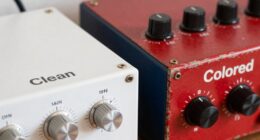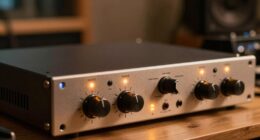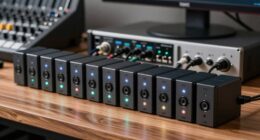To be a music producer, fuel your success by nurturing your passion for music. Learn music theory to understand the building blocks of melody and harmony. Master a DAW like Ableton Live to transform your musical ideas into professional tracks efficiently. Explore sound design techniques to create unique sounds and textures. Arrange your music skillfully to craft engaging compositions. By mastering these techniques, you'll elevate your music production skills and take your creations to the next level. Investigate further to uncover more valuable insights and tips to enhance your journey in music production.
Key Takeaways
- Develop passion for music to drive creativity and dedication.
- Master music theory, DAWs, and sound design for technical proficiency.
- Learn music production techniques like arranging, layering, and mixing.
- Invest in education, enhance creativity, and seek continuous skill development.
- Network with professionals, seek mentorship, and stay updated with industry trends.
Passion for Music
Your love for music drives your creativity and dedication as a music producer. Being passionate about music is the cornerstone of your journey in the music industry. Music producers with a genuine love for music are the ones who truly stand out.
Your passion for music is what keeps you motivated and dedicated to the craft. It's this deep-rooted passion that fuels your commitment to creating successful music that resonates with others.
As an aspiring music producer, your genuine love for music will be your guiding light. It's this passion that will allow you to connect emotionally with your work, infusing it with meaning and depth. When you're truly passionate about music, you're more likely to invest the time and effort required to excel in the industry.
Your passion for music won't only drive your creativity but also inspire those around you. Stay true to your love for music, and success as a music producer will unquestionably follow.
Learn Music Theory

To become a skilled music producer, you must grasp the fundamentals of music theory. Understanding scales, chords, and harmony will equip you with the tools to compose and arrange music effectively.
These foundational concepts are essential for enhancing your creative decisions in the studio.
Basic Music Theory
Explore the world of basic music theory to understand essential concepts like rhythm, melody, harmony, key signatures, scales, and chords. Music theory serves as the foundation for creating and analyzing music effectively. By grasping the basics of music theory, you can enhance your music production skills and elevate your compositions.
To investigate further into basic music theory, consider the following key elements:
| Element | Description | Importance |
|---|---|---|
| Rhythm | The pattern of sounds in music | Essential |
| Melody | The sequence of musical notes | Fundamental |
| Harmony | The combination of different notes | Vital |
Understanding these aspects of music theory will not only aid in your creative process but also enable you to communicate musical ideas more effectively. By familiarizing yourself with these foundational concepts, you lay a strong groundwork for your journey as a music producer.
Practical Applications
Mastering practical applications of music theory is essential for enhancing your music production skills and bringing your compositions to life. Understanding music theory, including scales, chords, and harmonic structures, provides the foundation for effective collaboration with musicians and engineers. By speaking the language of music theory, you can communicate your ideas clearly, fostering creativity in the production process.
Music theory also plays a vital role in composition and arrangement. It offers a structured approach to crafting melodies, harmonies, and rhythms, allowing you to create cohesive and engaging music. Key signatures, time signatures, and musical notation further enhance your ability to produce professional-quality tracks.
Moreover, a deep understanding of music theory empowers you to experiment with complex musical elements, elevating the overall quality of your productions. By honing your skills in music theory, you open up endless possibilities for creating unique and enthralling music that resonates with your audience.
Master a DAW
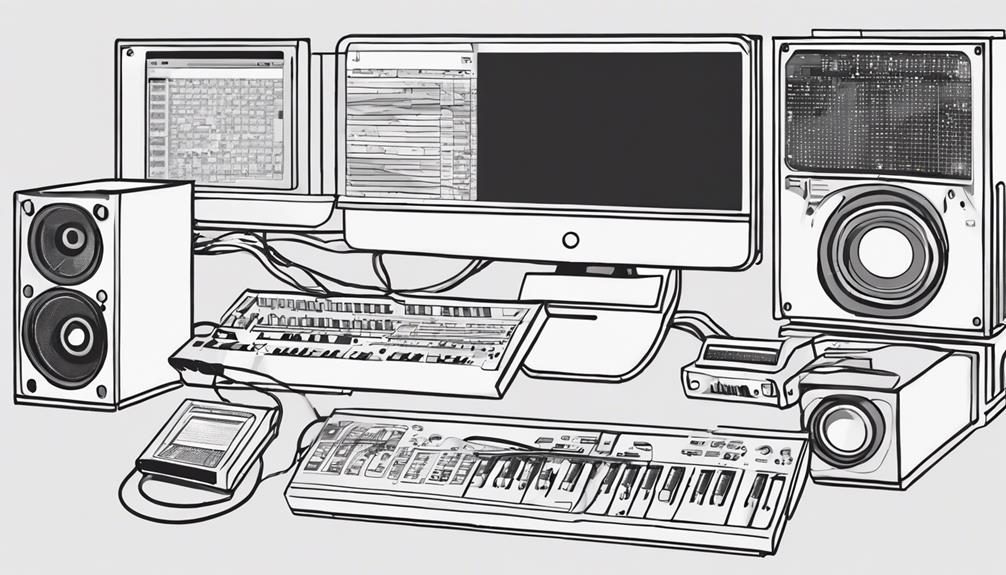
To master a DAW effectively, you should first choose suitable software that aligns with your music production goals.
Learning the essential functions and features of your selected DAW is vital for maximizing your productivity and creativity in music production.
Choose Suitable Software
Consider mastering a Digital Audio Workstation (DAW) like Ableton Live, Logic Pro, or FL Studio to enhance your music production skills. These DAWs are industry-standard software that offer unique features and workflows essential for creating music. Understanding MIDI sequencing, audio recording, editing, mixing, and mastering within a DAW is vital for professional music production. Each DAW has its own set of tools, effects, and plugin compatibility, allowing you to tailor your production process to your preferences. Here is a comparison of the three popular DAWs:
| Features | Ableton Live | Logic Pro | FL Studio |
|---|---|---|---|
| MIDI Sequencing | ✔️ | ✔️ | ✔️ |
| Audio Recording | ✔️ | ✔️ | ✔️ |
| Plugins | VST, AU | AU | VST |
| Workflow | Live Performance | Music Production | Beat Making |
Mastering a DAW will empower you to translate your musical ideas into professional tracks efficiently.
Learn Essential Functions
Start by familiarizing yourself with the essential functions of a Digital Audio Workstation (DAW) to enhance your music production skills effectively. A DAW is a powerful tool that allows you to manipulate audio, edit tracks, and utilize mixing consoles for a professional sound.
Understanding functions like MIDI editing, audio recording, mixing capabilities, and plugin integration is important for producing high-quality music. By mastering these functions, you can effortlessly apply effects, arrange compositions, and create a polished final product.
Moreover, learning shortcuts within your chosen DAW such as Ableton Live, Logic Pro, or FL Studio can greatly boost your workflow efficiency. These shortcuts help you navigate the software swiftly, speeding up the production process and increasing your productivity.
Familiarize yourself with the various tools and features your DAW offers to make the most out of your music production journey. Mastering these essential functions will elevate your skills and allow you to craft professional-grade music seamlessly.
Understand Sound Design
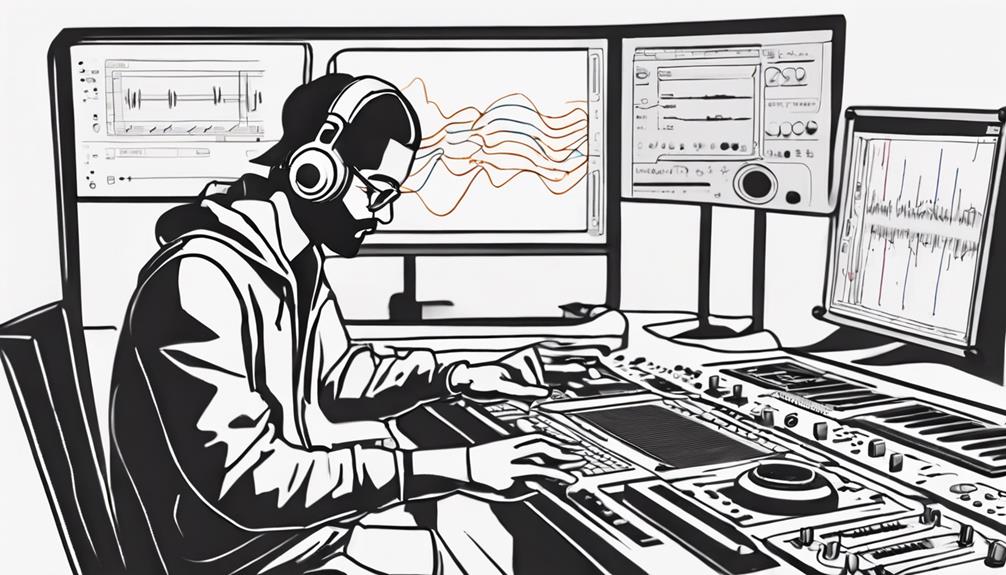
Explore the intricacies of sound design to elevate your music production skills and enhance the overall sonic experience for your listeners. Sound design is a fundamental aspect of music production that empowers producers to craft unique and enthralling sounds.
By employing techniques like layering, synthesis, and sampling, producers can create rich and intricate sonic landscapes that define genres and resonate with audiences. Layering involves combining multiple sounds to create a fuller and more dynamic audio experience, while synthesis allows producers to generate new sounds from scratch using synthesizers. Sampling, on the other hand, involves taking snippets of existing audio and manipulating them to create innovative textures and melodies.
Understanding sound design principles not only helps in shaping the mood and atmosphere of a track but also in adding depth and character to music productions. Mastering sound design enables producers to create signature sounds that set them apart and deliver immersive listening experiences that captivate their audience.
Arrange Music
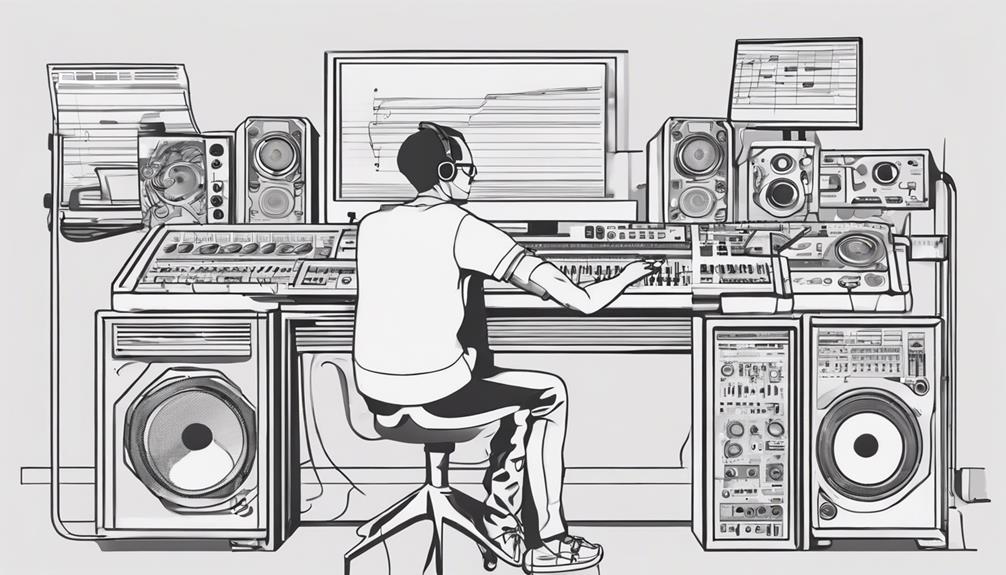
When arranging music, focus on mastering song structure basics, layering instruments effectively, and utilizing segue techniques for smooth flow.
Experiment with different arrangements to find combinations that work best for your composition.
Remember to pay attention to the balance of sound and space to create a cohesive and engaging musical piece.
Song Structure Basics
Understanding the basics of song structure involves familiarizing yourself with the typical arrangement of sections like intro, verse, chorus, bridge, and outro. Each section plays an important role in shaping the overall storytelling of the song.
The verse typically carries the main lyrics, setting the scene and building the narrative. In contrast, the chorus acts as the heart of the song, delivering the central message or memorable hook that listeners will latch onto.
Bridges serve as connectors, offering a change of pace or tone to keep the music engaging. By strategically arranging these sections, you can create a dynamic and cohesive musical journey for your audience.
Layering Instruments Effectively
To effectively layer instruments in music production, focus on combining multiple sounds purposefully to create a rich and full sonic landscape.
When arranging instruments, make sure that each layer contributes meaningfully to the overall sound by providing melody, harmony, rhythm, or texture.
Consider the frequency range of each instrument to prevent muddiness and optimize clarity in the mix.
Experiment with various instrument combinations to find the perfect blend that enhances the musical impact you desire.
Utilize effects processing techniques to add depth and dimension to your layers, creating a more dynamic listening experience.
Remember to adjust parameters such as automation, EQ, panning, and volume to refine each instrument layer and achieve a balanced mix.
Transition Techniques for Flow
Improve the fluidity and cohesion of your music arrangement by incorporating connection techniques such as risers, sweeps, and drum fills. When moving between sections, these elements can help smoothen the flow and maintain listener engagement.
Here are some key connection techniques to enhance the overall coherence of your music:
- Utilize Risers: Build anticipation and signal upcoming changes by incorporating risers that gradually increase in intensity and pitch.
- Experiment with Sweeps: Create a sense of movement and progression by using sweeping sounds to link different parts of your track seamlessly.
- Incorporate Drum Fills: Add energy and impact to your shifts with well-placed drum fills that lead into the next section with rhythm and flair.
- Implement Automation: Use automation on effects like filters and reverbs to smoothly evolve sounds and textures, enhancing the overall connection experience.
Mix Tracks
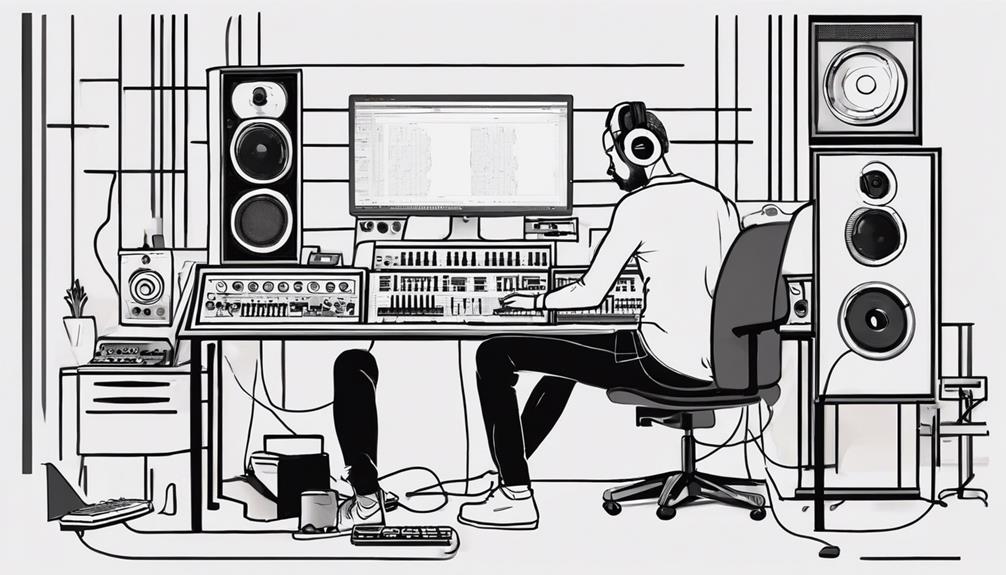
Balancing vocals, instruments, and effects is vital when mixing tracks to create a cohesive sound. To start, apply EQ to sculpt the frequencies of each element, making sure they sit well together in the mix.
Use compression to control the dynamic range and add punch to your tracks. Incorporate reverb thoughtfully to create space and depth, but be careful not to drown out the mix.
When it comes to positioning elements within the stereo field, experiment with panning to give each track its own space. Utilize stereo imaging techniques to widen or narrow the soundstage, adding a sense of dimension.
Additionally, automation plays a key role in adding movement and dynamics. By automating parameters like volume, panning, and effects over time, you can create a more engaging listening experience.
Remember to use reference tracks to guide your decisions and ensure your mix achieves a balanced tonal quality and proper stereo width.
Master Your Final Product
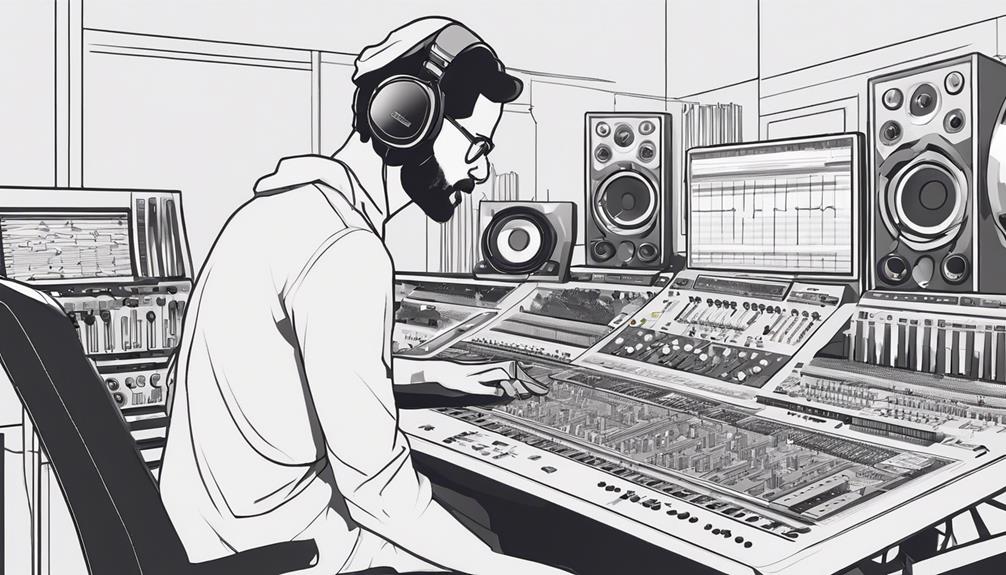
Mastering your final product is an essential step in achieving a professional sound for your music. This stage is where the audio is finely tuned, balanced, and optimized for various playback systems by a skilled mastering engineer.
Here are some key aspects to keep in mind during mastering:
- Fine-tuning Audio: The mastering engineer works on correcting any issues, ensuring consistency in sound quality across tracks, and enhancing the overall sonic characteristics.
- Specialized Tools: Utilizing tools like equalization, compression, stereo enhancement, and limiting helps in achieving a polished and cohesive sound.
- Improved Clarity: Proper mastering results in enhanced clarity, balance, and depth in your music, making it ready for distribution on different platforms.
- Playback Optimization: A well-mastered track translates well across various devices and environments, delivering a balanced and professional listening experience.
Invest in Education
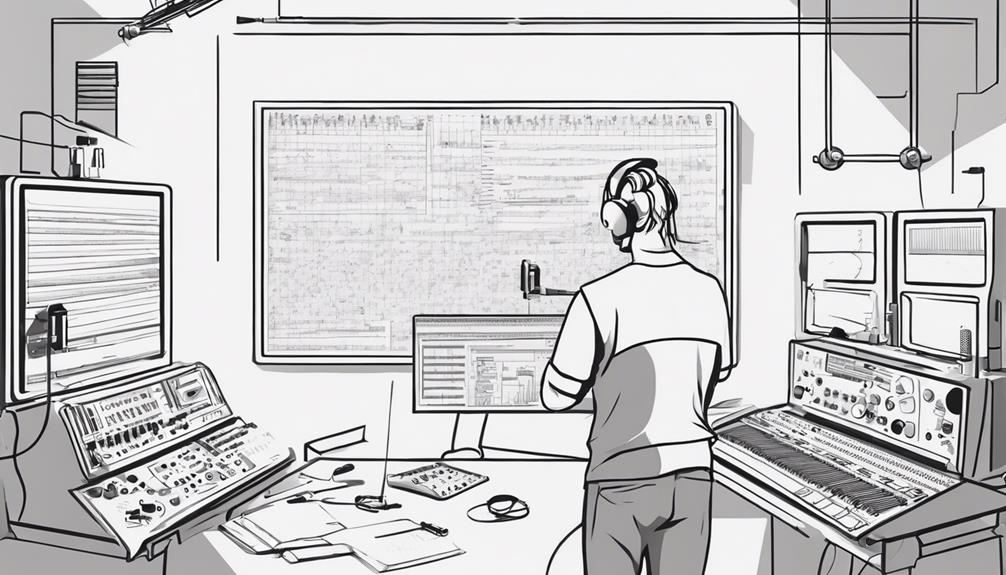
Consider investing in your education to enhance your skills and knowledge as a music producer. Enrolling in music production courses or workshops can provide you with essential skills and techniques vital for your development in the field.
If you aim for more in-depth knowledge, pursuing a degree in music production, audio engineering, or a related field could be advantageous.
Attending music production seminars, conferences, and industry events not only allows you to network but also offers valuable insights into the industry.
Seeking mentorship from experienced music producers can provide you with hands-on learning experiences and valuable guidance as you navigate your career. These mentors can help you refine your technical skills, develop your unique sound, and understand the intricacies of the music industry. They may also offer insights into opportunities, such as networking tips or guidance on how to become a music production intern, which could serve as an excellent stepping stone into the professional world. By building strong relationships with industry veterans, you open doors to learning directly from their successes and challenges.
Additionally, exploring online resources, tutorials, and forums can help you expand your knowledge base and keep you updated on the latest industry trends.
Enhance Creativity
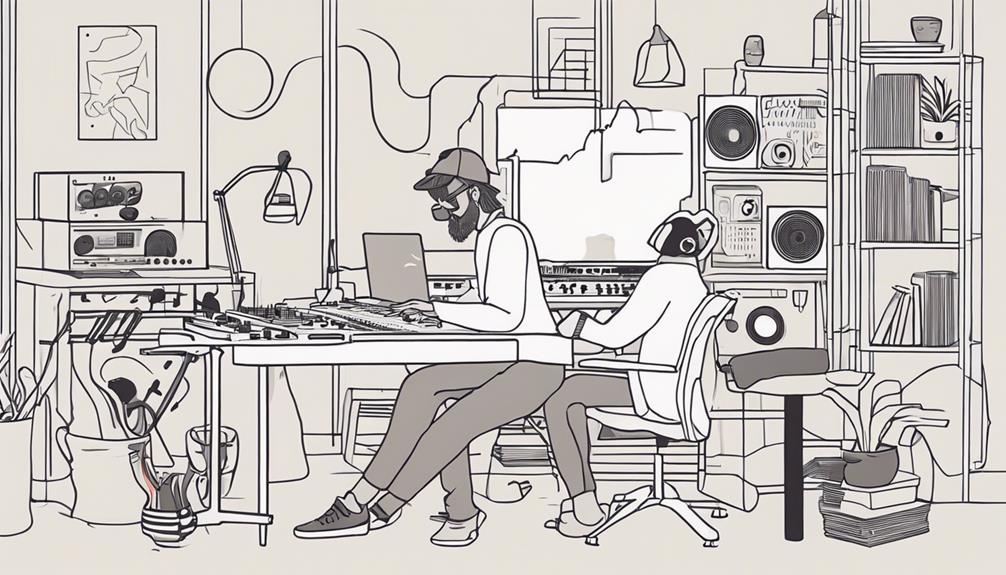
To enhance your creativity as a music producer, experiment with different musical styles, genres, and techniques to broaden your creative horizons.
Collaborate with other musicians, producers, and artists to spark new ideas and inspiration.
Utilize tools like MIDI controllers, synthesizers, and virtual instruments to enhance your creative process.
Draw inspiration from your surroundings, emotions, experiences, and personal stories to infuse depth into your music production.
Embrace creative challenges, take risks, and think outside the box to push the boundaries of your music production skills.
Continuous Skill Development
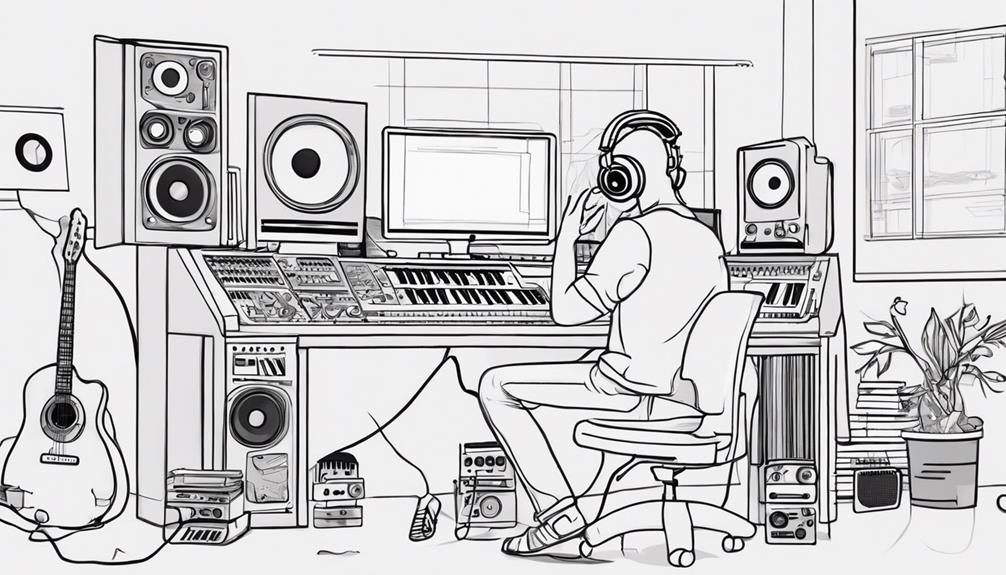
Regular practice and exploration are vital to enhancing your skills as a music producer. Learning new software features, mastering diverse music genres, and experimenting with innovative production methods are essential for continuous skill development.
Seeking feedback from industry professionals and peers can offer valuable insights to help you improve and grow as a music producer. Attending workshops, online courses, and music production seminars is pivotal to staying updated on industry trends and refining your production skills.
Additionally, experimenting with new tools, techniques, and equipment can push your creative boundaries and lead to breakthroughs in music production. Remember, skill development is a dynamic process that requires dedication and a willingness to learn and adapt.
Frequently Asked Questions
How Do I Start Myself as a Music Producer?
Start by defining your music production goals. Set up a creative workspace with essential tools. Learn an instrument, music theory, and audio basics. Practice consistently and experiment. Seek feedback and produce tracks regularly to progress.
Can You Teach Yourself to Be a Music Producer?
You can mold melodies like clay, crafting beats from raw talent. Through trial, error, and relentless curiosity, you'll carve your path as a self-taught music producer. Embrace the journey; the rhythm awaits your touch.
How Can I Be the Best Music Producer?
To be the best music producer, develop a unique style, collaborate with others, stay updated on industry trends, refine your skills, and seek feedback. By doing so, you'll enhance your work, grow, and build a strong reputation.
How Can I Be a Successful Music Producer?
To be a successful music producer, immerse yourself in the industry's rhythm. Craft a unique sound, connect with fellow creators, and stay on beat with trends. Amplify your skills, showcase versatility, and compose your path to victory.
Conclusion
So there you have it – the ultimate guide on how to be a music producer!
Did you know that the average salary for a music producer in the United States is $52,000 per year?
With passion, dedication, and continuous learning, you can achieve success in this exciting field.
Keep honing your skills, investing in your education, and never stop creating music that inspires you and others.
The world is waiting for your unique sound!

